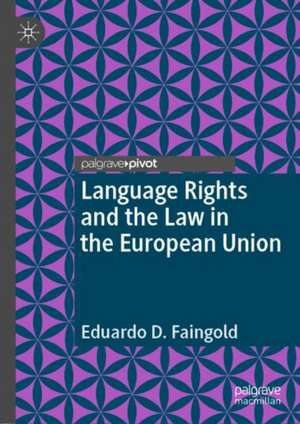Language Rights and the Law in the European Union
Autor Eduardo D. Faingolden Limba Engleză Hardback – 7 feb 2020
Preț: 451.65 lei
Nou
Puncte Express: 677
Preț estimativ în valută:
86.43€ • 89.69$ • 72.24£
86.43€ • 89.69$ • 72.24£
Carte tipărită la comandă
Livrare economică 17-31 martie
Preluare comenzi: 021 569.72.76
Specificații
ISBN-13: 9783030330118
ISBN-10: 3030330117
Pagini: 149
Ilustrații: XIII, 149 p. 1 illus.
Dimensiuni: 148 x 210 x 18 mm
Greutate: 0.35 kg
Ediția:1st ed. 2020
Editura: Springer International Publishing
Colecția Palgrave Pivot
Locul publicării:Cham, Switzerland
ISBN-10: 3030330117
Pagini: 149
Ilustrații: XIII, 149 p. 1 illus.
Dimensiuni: 148 x 210 x 18 mm
Greutate: 0.35 kg
Ediția:1st ed. 2020
Editura: Springer International Publishing
Colecția Palgrave Pivot
Locul publicării:Cham, Switzerland
Cuprins
Chapter 1: Introduction.- Part 1: European Union Language Legislation.- Chapter 2: Language Rights in the 2004 Draft of the European Union Constitution.- Chapter 3: Language Rights in the Treaty of Lisbon.- Part 2: Language Legislation in European Union Member States.- Chapter 4: Language Rights and the Law in Catalonia.- Chapter 5: Language Rights and the Law in Denmark.- Chapter 6: Summary, Conclusion and Directions for Future Research.
Recenzii
“Faingold offers a thorough understanding of linguistic minorities’ language rights in the EU by situating his analyses in various legal, political and social settings. … the book provokes thoughts about possible solutions to address LPP issues in a context of linguistic diversity, such as the author’s own suggestion of making cautious adjustments to language laws and policies to help facilitate the linguistic integration of minorities into the EU.” (Chenghao An and Zhonghua Wu, The European Legacy, Vol. 28 (2), 2023)
“Examines the provisions about language rights in several selected legislative texts at both national and supranational levels. … offers some meaningful insights into the possible approaches to improving the linguistic rights in EU legislation,as well as future directions for the research on the legal language status of linguistic minorities in other parts of the world. This book belongs on the shelves of practitioners involved in legislation drafting as well as scholars in forensic linguistics, language policy and language rights.” (Yuxin Liu and Fumin Fang, International Journal of Legal Discourse, July, 2021)
“Examines the provisions about language rights in several selected legislative texts at both national and supranational levels. … offers some meaningful insights into the possible approaches to improving the linguistic rights in EU legislation,as well as future directions for the research on the legal language status of linguistic minorities in other parts of the world. This book belongs on the shelves of practitioners involved in legislation drafting as well as scholars in forensic linguistics, language policy and language rights.” (Yuxin Liu and Fumin Fang, International Journal of Legal Discourse, July, 2021)
Notă biografică
Eduardo D. Faingold is Professor of Spanish and linguistics at the University of Tulsa, USA.
Textul de pe ultima copertă
“The strength of Language Rights and the Law in the European Union is that the author challenges a range of conventional wisdoms and even conventions regarding the legal position of minority languages in the European Union, convincingly presenting the case that language justice is not yet achieved for citizens who speak traditional EU minority languages. Apart from possibly sparking off some controversy in certain circles, Language Rights and the Law in the European Union most definitely will stimulate further research on the quest for language justice for all who dwell on European soil.” –Theodorus du Plessis, University of the Free State, South Africa.
This book examines the language policies relating to linguistic rights in European Union law and in the constitutions and legal statutes of some European Union member states. In recent years, the European Union has seen an increase in claims for language recognition by minority groups representing a considerable population (such as Catalan in Spain and Welsh in the UK). Additionally, there is a developing situation surrounding the official use of English within the European Union in the aftermath of the Brexit vote. In light of these two contexts, this book focuses on the degree of legal protection afforded to linguistic groups in the European Union. It will be of interest to students and scholars of language policy, EU law, minority languages and sociolinguistics.
This book examines the language policies relating to linguistic rights in European Union law and in the constitutions and legal statutes of some European Union member states. In recent years, the European Union has seen an increase in claims for language recognition by minority groups representing a considerable population (such as Catalan in Spain and Welsh in the UK). Additionally, there is a developing situation surrounding the official use of English within the European Union in the aftermath of the Brexit vote. In light of these two contexts, this book focuses on the degree of legal protection afforded to linguistic groups in the European Union. It will be of interest to students and scholars of language policy, EU law, minority languages and sociolinguistics.
Eduardo D. Faingold is Professor of Spanish and linguistics at the University of Tulsa, USA.
Caracteristici
Discusses the historical, economic, educational and political contexts of language status and use within the European Union Examines two European Union member states as case studies of minority language rights and linguistic policy Analyses the capacity for EU law and EU member states to recognise and accommodate linguistic diversity
